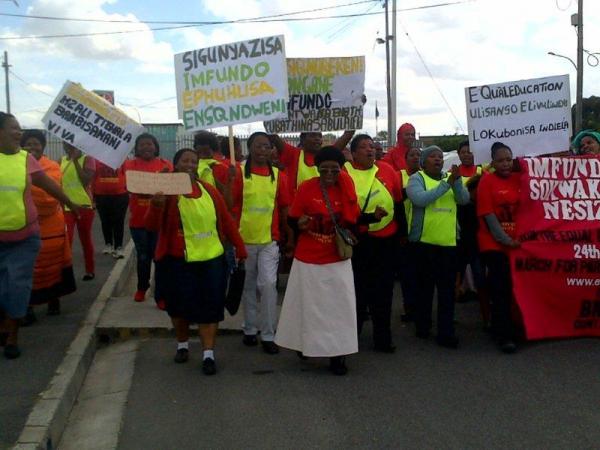Khayelitsha parents march for quality education

As the country was celebrating Heritage Day, about 300 parents, teachers and members of Equal Education (EE) marched from different points in Khayelitsha to Site B Hall. They wanted to draw to the attention of Basic Education Minister Angie Motshekga the need for quality education for their children and to have standards set for school infrastructure.
On 12 September, Motshekga released new draft regulations for minimum uniform norms and standards for school infrastructure for public comment (until 11 October).
Parent and EE member Aphiwe Mangxola said, “The march was not only about the norms and standards, but we also wanted to show the minister that as parents, we are involved in our children’s education.
“We were also marching to raise awareness about the poor state of education in many of the schools … the environment that some of the learners have to study in, and the big problem of a lack of textbooks.
“We vote and put people in power, now it is time for them to use that power to make the education system right.”
EE’s Norms and Standards campaign began in 2011 as a response to the organisation’s frustration with the state of schools in Khayelitsha, many of them lacking basic infrastructure such as libraries or decent toilets. The organisation believes that Motshekga is compelled to publish norms and standards in line with the South African Schools Act.
EE’s primary research was conducted in Khayelitsha in 2008. There was a lack of basic infrastructure in Khayelitsha, but there were worse conditions in the Eastern Cape and Limpopo.
In April, GroundUp attended a two-day solidarity visit organised by EE about conditions of schools in the Eastern Cape. Nyangilizwe Senior Secondary School was one of the worst schools in terms of sanitation. The school had eight dilapidated, filthy pit toilets, four for males and four for females. Teachers and students used the same toilets.
IsiXhosa educator and head of department at Nyangilizwe, Pateka Nkonki, said two weeks after the solidarity visit, 10 new toilets were installed and they also received textbooks. “A lot still needs to be done in our school, but what we have received so far has made a difference. We are just hoping that more will come in time.”

This article is licensed under a Creative Commons Attribution-NoDerivatives 4.0 International License.


